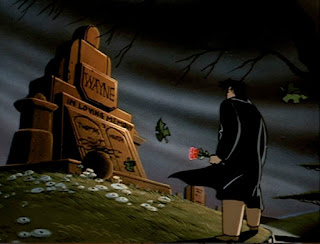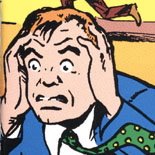Batman: The Animated Series Re-Watch: Episode Three: Nothing to Fear
As a psychological study on Batman and what makes him tick, Nothing to Fear is a great episode. When dosed with the Scarecrow's fear toxin, Batman sees his worst fear, that being Batman is a disgrace, a failure in someway to live up to his father's example. It puts into question the premise of the character, that maybe it's a mistake to respond to personal tragedy with vigilante justice.
The show resolves this internal conflict with two moments of catharsis. The first is when Alfred reassures Bruce that of course Thomas Wayne would be proud of him, because "I'm so very proud of you." This, in a line, both cements being Batman as a morally responsible choice (as Alfred is the voice of sanity in the show) and establishes Alfred relationship to Bruce: Alfred is Bruce's surrogate father. Once again, the point is made that Batman, Robin, and Alfred are not just partners in crime, but a real family.
The other moment of catharsis comes when, hanging from the edge of a burning zeppelin, in the face of a giant, skeletal vision of his father, Batman recites lines that would forever be burned into the hearts of young Batman fans (and forever be parodied by Darkwing Duck), "I am vengeance. I am the night. I AM BATMAN!" Alfred may have given Bruce the perspective and support he needed, but Bruce is still plagued by his fears until he accepts his mission, "vengeance," his method, "the night," and his true identity, "Batman."
It gets at the heart of why Batman fears he's disgracing his parents. In order to be their vengeance, he has to be Batman, and he has to stop being Bruce Wayne. Wayne becomes a shell, a mask, the petty playboy so despised by Dr. Long. The vision of his father calls him both "Bruce" and "a disgrace," and in order to do his job, Batman has to reject both of those titles.
The weakness of this episode is the Scarecrow himself. There are a lot of good interpretations of the character out there, from his first appearance in 1941 to Cillian Murphy's portrayal in Batman Begins. A villain who uses fear as a weapon should make an excellent foil to Batman, who preys on "a superstitious and cowardly lot." And this episode makes a couple of nods at that, a dry remark from Alfred and Batman's use of the fear gas on Crane at the end. But mostly, the Scarecrow's pretty boring.
His motivation is mundane. When he explains to his two dim-witted thugs, incongruously named Nigel and Anthony, why he's attacking the school, we hope that there's some complicating factor. But, in fact, the Scarecrow likes to scare people, he got as a job that allowed him to scare people, Dr. Long fired him for scaring people, and now he's going to scare people until they allow him to scare more people. Dr. Long, played by professional cranky old man Kevin McCarthy (who recently passed), may be a jerk, telling Bruce Wayne "I don't like you and your dead father wouldn't like you either," but he hardly deserves to have his university destroyed for firing a sadist.
And the Scarecrow's plan is pretty boring too, a terror campaign to cripple the school and scare people away from attending. There's hints of how much more interesting the Scarecrow could be.In one scene, he uses fear to drive a crowd of people to mob Batman. The idea that he could use fear to manipulate people presents a lot more interesting plot and character potential, which the writers will play with in later episodes. But here, he mostly uses the gas to incapacitate his victims.
The Scarecrow's visual design is uninspired, like a cheap Muppet knock-off, and Henry Polic II just isn't an engaging voice actor. In the end, he's not as much of challenge for Batman as the fear gas itself is. Once Batman overcomes the gas, the Scarecrow himself goes down easy.
The fear gas allows the animators a lot more room for creative moments, from a great representation of claustrophobia as a shrinking jail cell, to the face in the flames, the Fantasia-inspired winged demon at the end. A lot of the mood is also set by Shirley Walker's score, who pull out allusions to Psycho and Night on Bald Mountain to move the audience.
Special attention should also be paid to the voicework of Richard Moll, aka Bull from Night Court. He'll get a lot more attention later, as he voices Harvey Dent, but in this episode, he's doing fantastic yeoman's work as the Scarecrow's two hoods, the Bat-Computer, and especially the haunting, chilling voice of the late Thomas Wayne. Again, it's the vision of Thomas Wayne who's the real antagonist here, and Moll captures that character perfectly.
Other things to note:
We finally learn Summer Gleeson's name and occupation in this episode, though she does little else than deliver some exposition and call Batman a loser (in a vision).
Two episode after sending the SWAT Team after him, the police have eased up on Batman. Only Bullock is still openly antagonistic, but without any support, he moves from being Batman's Javier to being his Lestrade. Not that Batman has earned their trust, really, since he totally withholds evidence from them (that maybe they could have used to track down the Scarecrow faster) and for the first time, pull off his signature move of disappearing from a conversation the moment Bullock turns his back.
When Scarecrow sets a trap for Batman by releasing his fear gas at the door, Batman enters already wearing his gas mask. Thus establishing that Batman isn't just smart, he's usually a step ahead of his opponents.
Both thugs fall from the zeppelin and Batman fails to save either of them. Fortunately, Gotham seems to be full of soft landing zones.
And finally, while the memory of his dead parents is a driving theme of the episode, it is NEVER said how they died or how their deaths were directly responsible for Bruce becoming Batman. Maybe it's because everyone in America knows what happened, and maybe it's because how they died isn't as important in this episode as the fact that they are gone, and Bruce Wayne can't get them back.










No comments:
Post a Comment